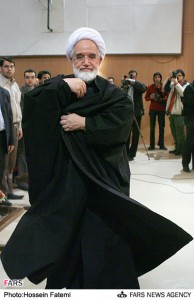The Latest from Iran (29 April): Preparations
 Thursday, April 29, 2010 at 14:20
Thursday, April 29, 2010 at 14:20  2020 GMT: A Cleric's May Day Message. Grand Ayatollah Mousavi-Ardebili, meeting workers in advance of May Day, has said: “Today the problems are many and to solve them either no actions are taken or [the government] is incapable of taking any actions. The main issue is that solving these problems has been assigned to those who are not experts in these topics.”
2020 GMT: A Cleric's May Day Message. Grand Ayatollah Mousavi-Ardebili, meeting workers in advance of May Day, has said: “Today the problems are many and to solve them either no actions are taken or [the government] is incapable of taking any actions. The main issue is that solving these problems has been assigned to those who are not experts in these topics.”Mousavi-Ardebili also touched on the charges of impropriety against the Government: “Our expectations from Parliament is to show more resistance against the unlawful actions [of the administration] because if, in the Parliament that is the house of the people and is where the laws are passed, these issues are ignored the situation would be worse in other places.”
NEW Iran Video and Summary: The Mousavi Statement for May Day/Teachers Day (29 April)
NEW Iran: The Establishment Frets Over the Supreme Leader
Iran Document: English Text of Mousavi-Karroubi Meeting (26 April)Iran: President Ahmadinejad’s Joke of the Day
The Latest from Iran (28 April): Making a Date
Mousavi-Ardebili added, “These days to solve the problems there is nothing left for us to do but praying, since when we give our inputs about an issue it is being ignored.”
1940 GMT: Political Prisoner News. Days before National Teachers Day and planned demonstrations, it is being reported that Alireza Hashemi, the Secretary General of the Teachers Organization, has been arrested.
1500 GMT: The Oil Squeeze. It's no longer fresh news that Italy's largest oil and gas company, Eni, is pulling out of Iran projects because of the prospect of tougher US sanctions on any firm dealing with Tehran (see Tuesday's updates). It is significant that the news is now being carried by Press TV.
1455 GMT: We've posted today's Mir Hossein Mousavi video, accompanied by a summary from Radio Zamaneh, as a separate entry.
1330 GMT: Writing About the Crisis. Our German Bureau reports that prominent Iranian poets and writers, including Simin Behbahani, Yadollah Royai, Esmail Khoi and Majid Naficy, have contributed to a new anthology, "Protest of the Pen", published in Persian.
0945 GMT: Investigation or Cover-Up? Shadi Sadr offers her views on the enquiry into the Kahrizak Prison abuses, leading to the death penalty for two police officers and a prisoner:
Gentlemen! Enough magic! We know and you know that the story cannot vanish with the execution of three individuals; indeed, no injury can be cured by more death and execution. The only thing that can satisfy us is knowing the truth about all victims of Kahrizak; the truth about the death of Ramin Pourandarjani, the assigned physician at the facility; and the description of what transpired from the perpetrators of the crimes, on national television.
0940 GMT: Mir Hossein Mousavi has released a video statement for May Day and Iran's Teachers Day (2 May).
0935 GMT: Political Prisoner Watch. Green Voice of Freedom has a summary of recent arrests of students and the poor health of some detainees.
0925 GMT: Economy Watch. Voice of America claims that, of an estimated 8200 Iranian companies in Dubai, 400 have closed because of sanctions.
0920 GMT: Clerical Matters. Rah-e-Sabz offers an analysis of the President's relationship with senior clerics in Qom, claiming that there were tensions in Ahmadinejad's first term and that only a few marja are offering greetings for his second term.
0915 GMT: Labour/Political Prisoner Watch. Homayoun Jaberi, a member of the Syndicate of Tehran and Suburbs Bus Company, has been sentenced by the Revolutionary Court to a year in prison, suspended for three years (effectively a probation).
0835 GMT: Mr Verde is back, offering an analysis of the worries of the Iranian "establishment" over the position of the Supreme Leader.
0820 GMT: Corruption Watch (cont.). Elyas Naderan, the conservative member of Parliament who has been leading the campaign against the Government, has criticised the President for not waging a fight against corruption and for appointing questionable officials (for example, at Iran's Oil Commission), and (at NIOC etc.) because of political motivations.
0745 GMT: Corruption Watch. The drumbeat of criticism from conservative members of Parliament continues. Yesterday we noted Ali Motahari challenging underhanded dealings and nepotism in the judiciary; today we find Ahmad Tavakoli launching an even wider attack:
We have reached a state where political corruption is rampant, with some even trying to influence decision makers through bribes. This kind of corruption is much worse than economic corruption, because in economic corruption individuals pursue base and materialistic interest, but in political corruption it is possible that legal decisions would be made to facilitate certain people’s corrupt pursuits and lead to the interference of some in distributing the enormous oil proceeds.”
Political corruption is the involvement of politicians in economic corruption, whereby they buy and sell laws and regulations. This is a much more important disease that some are afflicted with now by trying to infiltrate the Majlis using bribes, threats or promises. Unfortunately we don’t have comprehensive laws dealing with political corruption.
If this problem is not dealt with today, tomorrow would be very late.
Tavakoli then gets specific, targeting the First Vice President Mohammad Reza Rahimi, accused of involvement in a major insurance fraud:"The judiciary is now facing a difficult test, because it has moved forward to investigate two important cases. One deals with an administration official and the other with a relative of a senior regime official. If the judiciary falls short of dealing with either case, in my opinion it would flunk the public opinion test and won’t have any standing left for combating corruption.”
0715 GMT: May Day. Rah-e-Sabz has now published the 15-demand declaration of the coalition of Iranian labour groups.
0645 GMT: So, after a flurry of statements from opposition figures (Mir Hossein Mousavi, Mehdi Karroubi) and groups (reformist parties, teachers, workers), we see if declaration will lead to action.
My interest is not in President Ahmadinejad's next move. Once more he is trying the foreign distraction, applying for and receiving a visa to attend the United Nations conference on the Nuclear Non-Proliferation Treaty next Monday. That is matched by a roll-call of statements from Government officials and supportive members of Parliament that it is the US who is the nuclear culprit --- see, for example, the assertion of Alaeddin Boroujerdi, the chairman of Parliament's National Security and Foreign Policy Committee, Alathat Washington should apologize for its failure to abide by its obligations under international law and the NPT.
No, time will be better spent looking for ripples, as in public gatherings of workers, teachers, and other activist groups for the week around May Day. And then the question is whether there will indeed be another wave for 12 June, the anniversary of the election.
An opening teaser question: will Mousavi, who has repeatedly been kept away by Iranian authorities from mass demonstrations since last June, finally move from statement to open defiance by joining the marchers six weeks from now?
 Ahmad Tavakoli,
Ahmad Tavakoli,  Alaeddin Boroujerdi,
Alaeddin Boroujerdi,  Alireza Hashemi,
Alireza Hashemi,  Ayatollah Mousavi-Ardebili,
Ayatollah Mousavi-Ardebili,  Dubai,
Dubai,  Elyas Naderan,
Elyas Naderan,  Eni,
Eni,  Esmail Khoi,
Esmail Khoi,  Green Voice of Freedom,
Green Voice of Freedom,  Homayoun Taberi,
Homayoun Taberi,  Iran,
Iran,  Iran Elections 2009,
Iran Elections 2009,  Italy,
Italy,  Kahrizak Prison,
Kahrizak Prison,  Mahmoud Ahmadinejad,
Mahmoud Ahmadinejad,  Majid Naficy,
Majid Naficy,  Mehdi Karroubi,
Mehdi Karroubi,  Mir Hossein Mousavi,
Mir Hossein Mousavi,  Mohammad Reza Rahimi,
Mohammad Reza Rahimi,  Mr Verde,
Mr Verde,  Nuclear Non-Proliferation Treaty,
Nuclear Non-Proliferation Treaty,  Press TV,
Press TV,  Rah-e-Sabz,
Rah-e-Sabz,  Shadi Sadr,
Shadi Sadr,  Simin Behbahani,
Simin Behbahani,  Voice of America,
Voice of America,  Yadollah Royai in
Yadollah Royai in  Middle East & Iran
Middle East & Iran 



